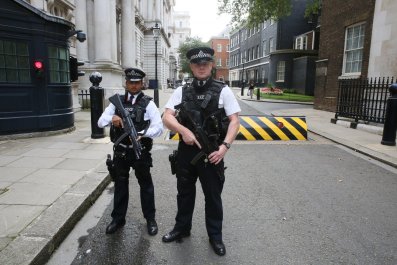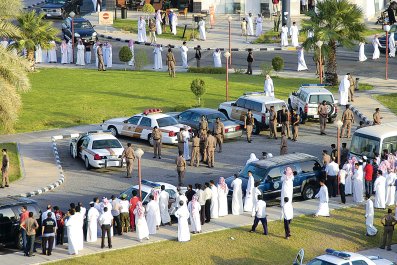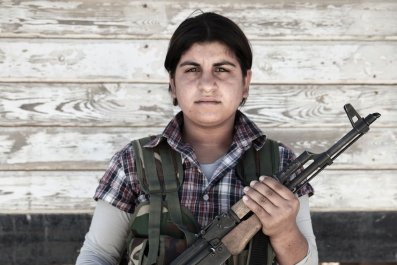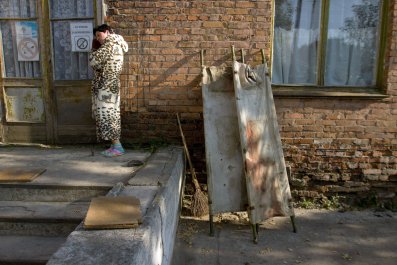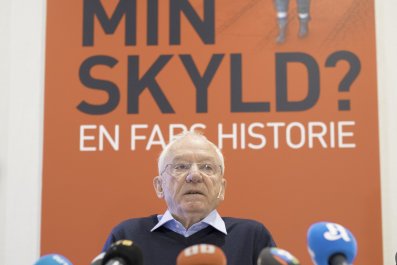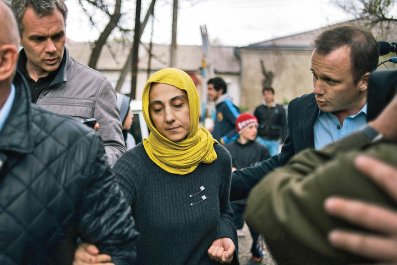In the post-9/11 counterinsurgency wars, stealth and cunning have counted for more than ground troops and air power, the limits of which are already apparent in the faltering bombing campaign against the Islamic State. And that puts American spy services at the tip of the spear once again.
If this were Texas Hold 'Em, the CIA would have a single ace face down with one flip left.
Training and deploying the so-called Free Syrian Army rebels, by all accounts, is not going to do much against ISIS, as the Islamic State is commonly known. The same goes for Iraqi troops, who ran at the first sight of ISIS last June and have had only sporadic success since. The Kurds, however valiant, are outgunned and friendless in the region outside of Tel Aviv. To crack ISIS and Al-Qaeda 2.0, the CIA and allied spy services are going to have to get inside, to recruit an agent who can lead them to the enemy's tents. The first time around, it didn't work so well: A double agent dispatched by Osama bin Laden blew himself up at a CIA base in Afghanistan in 2009, killing seven of the agency's best. It's the hardest spy game of all.
How hard? A startling new Israeli documentary, The Green Prince, suggests the opportunities—and limits—for what's possible.
Based on a best-selling memoir by Mosab Hassan Yousef, the son of a founder of Hamas, The Green Prince is an engrossing documentary on how Israel's counterintelligence agency, Shin Bet, managed to turn him into a spy against his fellow Palestinians—and his own father. It opens with a re-enactment of the young Yousef in an interrogation room, hooded and shackled after his arrest on a weapons smuggling charge, facing veteran Shin Bet operative Gonen Ben Yitzhak. The two enemies form a strange and enduring bond, which makes the film an odd kind of noir buddy flick.
Yousef, of course, grew up with a hatred of Israel in his DNA, but in the skilled hands of his interrogator, he slowly comes to accept that the methods of Hamas—its cynical exposure of its own people during its impotent rocket offensives, its indiscriminate killing of Israeli civilians, the murder of suspect comrades—conflict with its lofty creeds and, more critical, his idealism. He agrees to become Ben Yitzhak's spy, even goes back to prison so he can rat out jailed Hamas leaders.
"Recruiting is an art, a very difficult art," Ben Yitzhak says early in the film, which has won acclaim from critics and film festivals. "The main issue is understanding who is the person who is sitting in front of you. You have to understand his point of view, you have to understand his background, who is his family, what happened to him. You try to find [his] needs. And then when you know that, you know how to play with him."
Most important, Ben Yitzhak adds, "when you handle a source, you make him do things that he would never do, to your benefit…. And you do it by finding his weaker points and use them."
Ben Yitzhak discovered that Yousef carried a deep sense of shame and betrayal from being raped as a youngster by Palestinian elders. What else was he ashamed of? Hamas suicide bombings. What else? The self-dealing and casual brutality of Hamas bigwigs. Yousef's journey from shame to betrayal, skillfully guided by Ben Yitzhak, was not long.
In the film, written and directed by Nadav Schirman, a former Israeli Defense Forces officer, the interrogator's manipulation of Yousef works brilliantly. He doesn't lay a finger on his young charge. Yousef becomes an enthusiastic convert. The operations they run together bring down a score of top Hamas leaders, including his father. It's a tutorial on how to recruit and manage a spy, and a brilliant bit of Israeli propaganda.
"You can be pretty sure it's a doctored version of what happened," says Milton Bearden, a former CIA station chief in Beirut and Pakistan who, for a while during the Cold War, was also in charge of our spies in the Soviet Union. "Most of these people recruit themselves.… It's sometimes to our advantage to make it look like we heroically recruited a spy," he added, but it rarely happens. The CIA and FBI recruited a lot of Soviets, but "the volunteer had already made up his mind."
Shin Bet's biggest advantage, off course, is that it can pick up Palestinians virtually at will in the occupied territories. The Israelis can hold, interrogate, prosecute and jail prisoners as they like. Few such options are available to the U.S. in its fight with ISIS, five years after President Barack Obama closed down the CIA's secret prisons. "Hard targets are hard targets," Bearden says, noting the notorious lack of success the CIA has had against North Korea and Cuba and even the former East Germany, whose counterspy agencies seemed to control the espionage game from the get-go. And ISIS guys are "hard cases," he told Newsweek. It's far-fetched to think the CIA could capture and flip the son of an ISIS commander as Ben Yitzhak did with Yousef. "It's a long shot," said Frank Anderson, a former Near East division chief for the CIA's operations wing. "I could help you with a screenplay about it," he says, chuckling, and suggests it's not likely to happen outside the movies.
A volunteer ISIS turncoat, a staple of the intelligence wars, would even have a hard time making safe contact with Americans. As Bearden and other former CIA officials note, U.S. diplomatic outposts, especially in the terrorism-soaked Middle East, North Africa and South Asia, are forbidding fortresses, with multiple blast barriers and local troops at the gates. Hostile intelligence services and terrorist groups are watching. "You can't walk into an American embassy anymore," said Bearden. "They've got triple levels of security."
An alternate venue for recruits is through a friendly spy service, like Jordan's General Intelligence Directorate. But treachery lurks in such quarters. In 2009 the directorate presented the CIA with a supposedly disaffected Al-Qaeda follower, a physician who promised he could get close to bin Laden. He did, but not in the way the agency expected. On New Year's Eve, Dr. Humam Khalil al-Balawi arrived at the CIA's base wearing a suicide vest and killed seven agency operatives.
"One bad op shouldn't lead you to say we shouldn't use [a] liaison [service]," said Anderson, who served three tours of duty in the Middle East as a CIA station chief and headed the agency's Afghan Task Force in the late 1980s. "We shouldn't use liaison and do stupid things."
Outside of relying on the Jordanians (or Saudis and the like) again, the CIA either needs to capture its own potential turncoat—not likely—or to establish other, less forbidding entry points for disaffected ISIS members—like an Internet café that could be discreetly advertised as U.S.-friendly, Bearden suggests.
"The very first thing you have to do is have storefronts for the guy who decides, I hate this and want out," Bearden said, "so they know where to find you."
What drives them in? "Greed, revenge, even boredom," he says. And what does the CIA have to offer? "The three B's," he says. "One, they can believe in something; two, they can belong to something; and three, they get to break the other guy's stuff. It appeals to a whole class of males," he said. "It's the same reason guys join the Marines."
"History says it will happen," Frank Anderson says of an ISIS walk-in, "but we don't know when."
Jeff Stein writes SpyTalk from Washington, D.C. He can be reached more or less confidentially via spytalk@hushmail.com.











